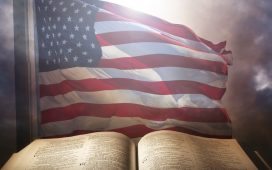Chris Bowen has signalled Labor could vote against the Morrison government’s religious discrimination legislation, characterising the bill as “friendless” – setting up a potential showdown in the final parliamentary sitting week for 2019, if the Morrison government brings the proposal on.
The New South Wales Labor right winger has been one of the more forceful voices internally post-election saying Labor must reconnect with faith communities, given Labor’s campaign review identified a Christian backlash in May. But Bowen says the Morrison government has botched the whole religious freedom process, and the current bill is “friendless”.
“I represent a very religious community,” the Labor frontbencher told Guardian Australia’s political podcast. “My electorate voted no on same-sex marriage and I voted yes, and I knew there would be a political price to pay for that, because I wasn’t representing the views of many of my constituents, but I was honest with them and upfront with them.”
“I think I’m right in saying I represent the most Catholic electorate in Australia, certainly in New South Wales, and there’s a heavy representation of Orthodox Christians,” Bowen said. “They are not just Christians, Christianity is very important to who they are.”
“But this bill is friendless. It is friendless”.
“The government has cocked it up so badly – I’ve got my religious leaders saying, we don’t like it, we think it is a pretty ordinary piece of legislation.”
The attorney-general Christian Porter released the government’s draft religious discrimination bill in August. Porter has said consistently the proposal will come to parliament before MPs leave Canberra for the summer.
But a spokesman for Porter would not give a definitive answer on Friday about whether the bill would be introduced as promised this coming week, the final sitting week for the year.
Government MPs believe it is possible the government will delay both internal and external consideration of the issue given the Morrison government suffered a major legislative defeat in the Senate this week, the Angus Taylor controversy is still front and centre, and the Porter proposal remains divisive inside the Coalition party room.
Some government MPs privately make the same point as Bowen – that the churches are not on board with the Porter proposal because they expected the Morrison government to deliver a more broad-ranging protection for religious freedom, rather than just deal with discrimination.
As well as pushback from the churches, there are objections from many other stakeholders about the proposal. Human rights and LGBTI groups, employer bodies and state anti-discrimination commissions are opposed, and key crossbench senators have said scepticism it is needed.
Opposition leader Anthony Albanese told the Labor caucus last week Labor supported freedom of religion, but did not support increasing discrimination. Bowen told the podcast the party was still to determine its final position on the bill. He said Labor was “all for religious freedom” but “I think the legislation as it is drafted is pretty bloody ordinary”.
The Labor frontbencher, who now has the health portfolio, said religion had been a difficult issue for Labor during the election, and the leadership group were worried during the contest about a negative backlash from faith groups about Labor’s progressive social policies.
The campaign coincided with considerable public controversy about Israel Folau’s commentary that hell awaits “drunks, homosexuals, adulterers, liars, fornicators, thieves, atheists and idolaters” which led to his sacking.
During the campaign, Bill Shorten said: “I don’t think if you’re gay you’re going to go to hell. I don’t know if hell exists actually. But I don’t think, if it does, that being gay is what sends you there.” Scott Morrison said Folau, as a public figure, should have exercised his freedom of speech more responsibly, but he also used the issue to call out to people of faith. “I admire people of religious conviction. I admire people who draw strength from their faith. I am one of those people.”
Bowen says faith, and protections for people to be able to articulate their faith in an increasingly secular age, was “a much bigger issue politically and electorally than anybody realised”.
He said Labor over the coming term needed to forge better connections with faith communities, and understand that some people feel there are restraints on what they can say. “If that’s the perception, that’s the reality. If they feel they can’t express their religious views, or they are potentially persecuted, then that’s a problem”.
“Conservatives and our critics in the media say Labor plays identity politics too much, but that’s bullshit,” Bowen said. “The Liberals play identity politics much more than we do, and much more effectively. They divide Australians. Scott Morrison in particular is a divider.”
He said faith was one issue where the Coalition was able to exploit division to its electoral advantage. But the most effective identity politics foray during the election, Bowen said, was the Coalition’s assault on Labor’s electric cars policy – a policy the government characterised as a “war on the weekend”.
Bowen said identity politics was now core to the Coalition’s courtship of voters. He said Morrison was able to persuade working people to vote against policies that would advance their material interests by declaring he was on their side culturally.
He said Labor needed to muscle up. “I say all right, if you want a fight about the culture wars, I say ok, sleeves up, let’s get into it and stand up for our values,” Bowen said. “We have to remind people we are on their side. We haven’t said that enough.”




